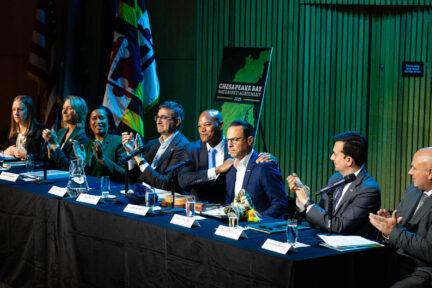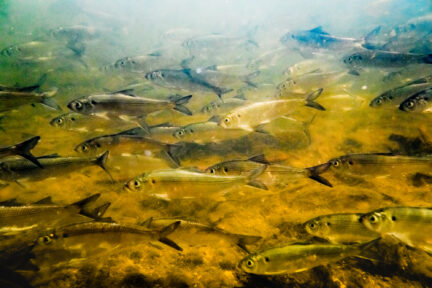Congress Asked to Reduce Water Pollution from Highways
Congress Asked to Reduce Water Pollution from Highways
The governors of the six Chesapeake Bay states, the mayor of Washington, D.C., and the chair of the Chesapeake Bay Commission have submitted a letter to Congress requesting that the reauthorized Federal Surface Transportation Act include a policy to reduce the flow of polluted water from federal highways. Measures to control pollution can be implemented during construction and retrofit projects.
The Federal Surface Transportation Act – formally titled the Safe, Accountable, Flexible, Efficient Transportation Equity Act: A Legacy for Users (SAFETEA-LU) – is the program that improves and maintains the surface transportation infrastructure in the United States, including the interstate highway system. SAFETEA-LU was signed into law in 2005 and expires on September 30, 2009.
Stakeholders in the effort to restore the Chesapeake Bay and its watershed believe the reauthorization of surface transportation infrastructure programs and funding presents a valuable opportunity to address a significant and growing pollution source to waterways in the region and across the country.
“Stormwater runoff from highways is a major source of pollution to waterways across our country and is especially harmful to the health of the Chesapeake Bay,” said Virginia Governor Timothy L. Kaine, who is also chairman of the Chesapeake Executive Council. “It is time to adopt policies to mitigate pollution from federal roadways so that cleaner water flows through our communities.”
Nationwide, roads and related infrastructure make up at least two-thirds of paved surfaces, which are impervious and do not allow water to soak into the ground. Instead, when it rains, pollution from sources such as tailpipe emissions, fluid leaks, break linings and tire wear are washed into the nearest sewer or waterway. Most federally funded highways were constructed without the stormwater controls needed to protect the health of streams, creeks and rivers.
About 66 percent of the waterways listed on the national Clean Water Act 303(d) list of impaired waters are polluted because of highway runoff – almost 30 percent of those waterways are in the Chesapeake Bay watershed jurisdictions of Maryland, Virginia, Pennsylvania, New York, Delaware, West Virginia and the District of Columbia. Also, in the Chesapeake Bay watershed, runoff from highways account for 22 percent of nitrogen and 32 percent of phosphorus coming from urban areas, according to a 2002 study.
Currently there are a variety of green infrastructure techniques that can mitigate the impact of stormwater runoff and, according to the letter, should be included in the reauthorized Federal Surface Transportation Act.
“Reauthorization of the Federal Surface Transportation Act provides a tremendous opportunity to reduce harmful pollution by implementing progressive green infrastructure practices,” said Virginia Delegate John Cosgrove, who is also chairman of the Chesapeake Bay Commission. “I am hopeful, as are my colleagues in the Chesapeake Bay restoration effort who joined me in signing this letter, that members of Congress can ensure that federal roadways no longer pollute local waterways.”
The letter was addressed to Representative James L. Oberstar (D-MN) and Representative John L. Mica (R-FL), who serve as chairman and ranking member, respectively, of the House Committee on Transportation and Infrastructure.
"Polluted runoff from highways and streets contributes significantly to poor water quality in our treasured estuaries and ocean coastal areas," said New York Governor David A. Paterson. "Significant federal funding to address this problem also will provide some relief to hard-pressed municipalities to ensure their important water resources remain clean for future generations."



